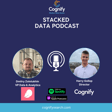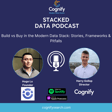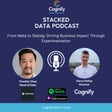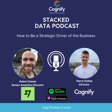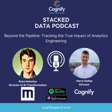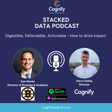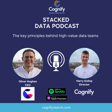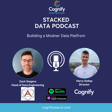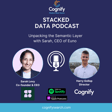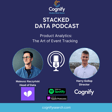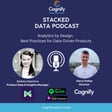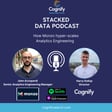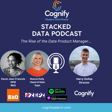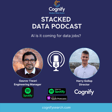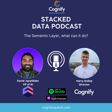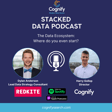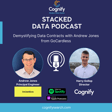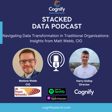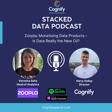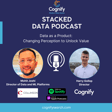Become a Creator today!Start creating today - Share your story with the world!
Start for free
00:00:00
00:00:01

030 - Challenges of leading a small data team
In this episode of Stacked Data Podcast, I’m joined by Manou, Head of Data & X at Medik8, to dive into the unique challenges of leading a small data team—and more importantly, how to overcome them.
✅ How do you prioritize when resources are tight?
✅ How can small data teams drive real business impact?
✅ What strategies help in building a strong team culture?
Manou shares practical strategies on ensuring data teams stay focused on high-value projects, align with business goals, and maximize their potential—even with limited resources.
If you’re leading (or part of) a small data team, this one’s for you.
Transcript
Introduction to Stacked Podcast
00:00:02
Speaker
Hello and welcome to the Stacked Podcast, brought to you by Cognify, the recruitment partner for modern data teams, hosted by me, Harry Gollop.
00:00:13
Speaker
Stacked with incredible content from the most influential and successful data teams, interviewing industry experts who share their invaluable journeys, groundbreaking projects, and most importantly, their key learnings.
00:00:25
Speaker
So get ready to join us as we uncover the dynamic world of modern data.
Challenges in Small Data Teams
00:00:34
Speaker
Hello everyone and welcome to another episode of the Stacked Data Podcast. Today I'm joined by Manu, the Head of Data at Medicaid. Today Manu is going to be sharing some of the biggest challenges faced by small data teams alongside his strategies to overcome them and how to ensure they're driving value and moving the business forward.
00:00:56
Speaker
Manu, it's great to have you on here. Pleasure that's for you to join me. are you doing? yeah Yeah, really good. Thanks. And yeah, thanks for having me. Pleasure to be a part of it. Brilliant. I know we've been we've been talking about this episode for some time, but really keen to dive in because you've obviously had the the step up to head of data Medicaid, leading a small but but powerful data team.
00:01:20
Speaker
And I know obviously in the industry, there's many data teams that are of ah a smaller size and have a lot of requirements. And I think it's going to be really interesting to discuss it. how you manage that, how you ensure a small data team is driving ah ah a good ah ROI and is really sort of driving ah positive value
Manu's Journey into Data
00:01:36
Speaker
for the business. So excited to to dive in, but it'd be great to start with what initially attracted you into the the field of data. And it'd be great to hear about your journey to becoming a data leader.
00:01:49
Speaker
Yeah, so actually I came in to the field of data in more of an unconventional route. I actually studied business, which is obviously quite related, especially when a lot of data roles require lot of business acumen. But then I did a master's in corporate governance and law, so completely separate. But what I realized whilst I was doing that, and I guess actually that kind of had some units to do with stats and to do with data. So there was a small element in there as well. But what i realized was the corporate life or the corporate roles weren't exactly for me. So after I studied that master's course, after I completed it, but then i actually found myself in a small organization carrying out the role of a CRM analyst, essentially.
00:02:27
Speaker
And from that moment, understanding how CRM systems worked, working with databases, kind of connecting that to other tools in that organization, and having to be really scrappy with it as well, because it was very small organization. The part the organization I was involved in was kind of in in a startup mode. It was starting from point zero, basically.
00:02:46
Speaker
So you try to be resourceful with very little around you. And it was just really, really fun. And I grew to really enjoy several aspects of it. One was the idea that being a data analyst or working in data, you're doing a technical role and you're working with stakeholders as well.
00:03:00
Speaker
So it's incredibly social, but you also get your time to to be very involved in problem solving, be very analytical, get involved with the detail, essentially. And also really like the variety of it. I think the world of data is one of the most varied fields you can get into and you can use it across industries, use lots of different kinds of data. So I think that is something that I really enjoyed as well and then finally, it also really appealed to me the fact that it is changing constantly. So it I guess if you like the idea that you're going to be learning all the time and and trying to adapt all the time, then yeah, that was also what got me as well.
00:03:33
Speaker
Yeah, I think that's what hooked me, how quickly the industry moves. And it's just moving quicker and quicker. You know, you go rewind 10 years ago, the cloud was only just sort of coming onto the scene. And now we're talking deep into generative AI and all what's to come with
Medicaid's Market Transition
00:03:50
Speaker
that.
00:03:50
Speaker
But look, it'd be great to dive into Medicaid. I suppose it'd be great, first off, to share who Medicaid are. and And also, I suppose, what's the makeup of your team? Yeah, for sure. And you know you're absolutely right. I mean, it's funny that you mentioned the cloud thing.
00:04:05
Speaker
I was thinking just yesterday about how whole films were based on not knowing what the cloud was. And it'd be like a running joke. If you were to come out saying you don't know what the cloud is today, it'd be a pretty different story. So yeah, definitely changed since then.
00:04:18
Speaker
But yeah, Medicaid. So Medicaid is a skincare brand and it's been around for roughly, I think, 15 or so years. So it's been around for a little while with loads of expertise and it used to predominantly focus on the professional market. So it's kind of like a very expert based brand, deliberately focusing towards clinics and in that range of professional kind of clientele. And then the past four or so years, it started growing rapidly and spreading out direct to consumer and everything like that and and became, you know,
00:04:47
Speaker
even more so of an exciting journey. And one of the best things about it actually is that it was started by two brothers who had a scientific background, but it is completely fully vertical. So it does everything from the manufacturing and the research of the product all the way through to selling it to the customer. So from a data standpoint, you have all of that wealth of data to work with. You're not just dealing with the e-commerce, you're not just dealing with the product design, whatever it might be, you're dealing with absolutely everything, which comes with its challenges and a very complicated, i guess, systems environment, but that's obviously part of the fun as well.
00:05:23
Speaker
So that's Medicaid, and I guess some of the part of it as well. And the team there is a growing team. So their data journey, so they definitely had in some kind of data environment before I joined.
Team Setup and Roles
00:05:35
Speaker
Previous to the past two years, I think it was a kind of Power BI set up where some insights were going through there. In the last year or two, it really started maturing on this journey. So that's when it got what's now called the modern data tech stack, which probably isn't so modern anymore, but the likes of some kind of ETL tool, then a cloud provider, then DVT, something like that, and then a visualization tool. So it's got your standard setup, and then you've got a group of analytic engineers, a team of about five, six people, and e ERP specialists who help connect some of the systems through as well.
00:06:07
Speaker
So that's generally the team. that work with me and yeah it essentially means that we're doing everything all the way from the engineering side all the way through to the dashboard design so yeah pretty very Brilliant. and And you mentioned that the analyst engineer being sort of a core role in the team. Are they are they sort of T-shaped analyst engineers? What happens on the front end and the actual creation of insights and dashboards? and that fall with them as well?
00:06:31
Speaker
Yeah. So it's an interesting one because i think the role of a data professional has changed even in the past three to five years. i think... Traditionally, you would definitely have somebody who was completely dashboard focused. You'd have your data engineers who would be doing a lot more complex, I guess, bespoke either Python or other language kind of code.
00:06:53
Speaker
Now, with the birth of low code and no code tools becoming really popular, typically the analytics engine engineer now does that bit and uses tools like 5chan or whatever it might be. Carries out all the transformation work in the middle.
00:07:05
Speaker
And then, yeah, absolutely. At Medicaid, they're also doing the dashboarding. They're delivering the insights. They're business partnering with areas of the organization so they can deliver them. They're working with their stakeholders heavily to understand what those needs and requirements are.
00:07:18
Speaker
So, yeah, it's it's a busy role. Yeah, I see this there's definitely yeah this lower at the bar of entry, think, to different areas, is it just in general to data, but to accessing these different roles. I think particularly in a smaller team where it's much better to have these versatile players in the team rather than your inch mile wide, mile deep specialists, which yeah can be hard to drive. I'm sure we can talk about can be hard to drive value from when you're operating in a small environment.
00:07:46
Speaker
So yeah, I suppose let's dive into what are some of the unique challenges that that small data teams face compared to larger teams.
Technical Expertise in Small Teams
00:07:54
Speaker
Well, mean, you kind of touched on it there, right? Which is this idea that you need to be super, super flexible in a smaller team.
00:08:00
Speaker
So You have challenges on several fronts. So one is the idea that you're covering quite a lot of technical expertise. And so therefore, you need to have quite a few hats on whether it's figuring out how to fix something when you're patching the insights in a visualization tool, or whether you're figuring out, okay, our ETL tool doesn't have a ready-built out-of-the-box solution for something we're trying to, some tool we're trying to connect to, some source we're trying to get the information from.
00:08:24
Speaker
So now I need to design something bespoke. So it's this idea that you do need to cover a lot of ground. with a small team and each of these people need to be able to do that. And then there's a second part of that, which is okay. You then also need to understand each other's area within the organization so that if there's holidays, sick leave, cover, whatever it might be, then then somebody else in that small team can step in and cover so one area of the business isn't being neglected at any one point.
00:08:49
Speaker
So that that's the initial thing with a small team, I would say, and it's trying to make sure that people feel like they're getting the access to the right area of the organization or the development that they want to get to at the same time of being in a position to cover the business where it needs to be.
00:09:03
Speaker
And look, I mean, I say this as if ah I'm an expert of setting that up. I mean, it's something that is always a constant work in progress and definitely not perfected in any environment I've been in yet.
00:09:15
Speaker
No, it's it's a constant moving process. I think we can touch upon more about how you nurture your team to have that malleability between roles. But I think one of the other biggest challenges I see when speaking to data leaders is the alignment prioritization. i mean, it's a challenging challenge. ah every data to team with with how to prioritize what projects and and what business departments, et cetera, but even more so when you've got limited resource
Aligning Data with Business Objectives
00:09:43
Speaker
in your team. So how do you go around that prioritization piece to make sure you're working on the right things at the right time?
00:09:48
Speaker
Yeah, i mean, ultimately, it's absolutely right. When you've got a small team, you've got way more requirements and requests than you're ever going to deliver on. So you've got to be picky with how you choose them, and you've got to make sure that whatever you are choosing or how you're receiving those is a really well set up structured system.
00:10:05
Speaker
One, to receive those requests, and two, to communicate back, i.e. on timelines. on whether it's something that will actually help what they're after. And prioritization there needs to come from a few different factors. So number one is having a really strong relationship with the stakeholders you're dealing with.
00:10:21
Speaker
So the way that I ah might, I don't know whether I'll build on this a bit later, but just for now, I'll say, you know You should have a business partnering kind of methodology where you're set up to work with the stakeholders for a few departments or one department where you can understand how they work, what they're working on, what their objectives are, so that when they send you requirement, it's really easy to have a dialogue in terms of how soon that should be delivered or when and why.
00:10:41
Speaker
You should always be able to tie your request back to the objectives of the organization. So the LT, the leadership in any organization should be really clear on the objectives are for that organization.
00:10:52
Speaker
It should be really clear what the metrics are that relate to those objectives. And then it should be really clear how each department feeds back into each of those. That way, when it comes to teams within the organization, like the data team,
00:11:04
Speaker
you can go, right, this is the request I've got through. Can I directly tie that back up? If I can, great, it's going to be on the list. If I can't, then I already need to go back and say, okay, well, we're carrying out this piece of work. The second part is then the ISOD or the rise in structures, however you want to see it, which is how quickly can it be built, to what benefit and and to what detriment as well. as So it's going to take a lot of resource to build something without a huge amount of impact from it, or it'll be a relatively quick build with quite a quick impact, i.e.,
00:11:31
Speaker
quite a big number of employees in the business might get ah benefit from it, or it might have a good impact on revenue. It might surface some hidden away results that people really need to see, or it's going to take a lot of work to do it, and only one person's going to see it and benefit, and it's not going to have a whole amount of impact on the organization.
00:11:48
Speaker
So those are the other things to consider when trying to prioritize this work. I think there's some great points in there. And obviously, I know yourself as a head of data and then the data leader have to deal with these types of challenges on on a daily basis. But I think there you you mentioned some important points there, which any level of data professional can take into their work around really partnering closely with the the stakeholder, really understanding what their priority is and what they're trying to achieve and and and deeply being connected to to what else is going on in the business and what else your workload looks like. So I think asking them
00:12:23
Speaker
qualified questions, especially when you've got multiple projects on the go to really understand and help you prioritize even as an analyst, et cetera, would really be super beneficial there. Is that something you look to coach on as well?
00:12:35
Speaker
Yeah, so but you've also got to get the balance right with that, which is if you're spending all of your time with a stakeholder, listening to every single thing they've got to say, which could be incredibly valid, and can still be important.
00:12:46
Speaker
The flip side of that is you have less time to actually carry out some of the tasks that you need to do. And the other side it, going back to the challenges we spoke about a second ago in terms of a small team, is the idea that, okay, it's probably not a one-to-one business partnership partnering system.
00:13:00
Speaker
I spoke about the fact that Medicaid has fully vertical system. So it's got lots and lots of departments within there all across organization. So within this smaller team, you've got several departments to one person, to one to one analytics engineer.
00:13:15
Speaker
So you've got to be really careful with your time, how you're making sure it's really effective with stakeholders to gather what they're after and and and then get it back. So to your point, in terms of coaching them, It would have to be the idea that when you're discussing them, there's really clear agenda items out a of it. It's really clear what you're trying to understand from the requests.
00:13:32
Speaker
It's really clear in terms of understanding what brings them value anyway. Can you actually be proactive on many things before having to be requested? Do you know their behaviors? or Do they tend to ask a little bit too late before a deadline? Do they tend to ask, do they have an understanding of the work involved in actually building out a data product?
00:13:51
Speaker
So yeah, there's a lot there's a lot to that in terms of coaching them. And it's all these factors trying to come together to to really understand the stakeholder and not give too much time, but not neglect them at the same time. It's that constructive sort of challenging as well, where you've got to understand when to when to say no and when to, I suppose, help them understand what they're asking for may not necessarily always be the the thing that they need as well. So it's a skill I think they've data professionals always need to constantly affect is that ability to manage and a stakeholder and gather requirements.
00:14:23
Speaker
I think one of the the other things that you mentioned was that sort of alignment between projects and what the data team is doing and that overall sort of business goal. That can be easier said than done. So so how how do you tackle that um in sort of aligning and making sure that the data projects you are working on are really achieving the the overall business goal?
00:14:44
Speaker
Yeah, which is a really fair question. And the the way I think to focus best on that is to have a really strong, transparent visibility of the task being worked on and then how it's being reported across the organization.
00:14:58
Speaker
So, I mean, and i'm happy to get into as much detail as you're asking, but just just high level at the moment, what I'd suggest is JIRA should be fairly accessible or whatever project management tool you have should be fairly accessible to leadership managers across the organization.
00:15:13
Speaker
I would say that some kind of roadmap has to be developed and shared with the leaders of the organization, even if it's void of any detail, just clear what projects have been worked on within the data team and communicated across.
00:15:25
Speaker
um And i would say that then on a more within team basis, the stand ups that take place, whether that's daily or every other day, and then your weekly longer meetings that might be more reflective or your retro is whatever they might be, need to all be tailored around the objectives of the organization.
00:15:42
Speaker
So it should just be kind of ingrained in from all across the organization. to within the team itself so that everybody has good visibility. Anyone can feel free to challenge. It's never seen as a criticism. It's always just curiosity, making sure it ties back to the necessary objective.
00:15:57
Speaker
And having that kind of environment and transparency should help with making sure what's been carried out is aligned to what's required for the org. And what about when it when it isn't quite aligned? Or have you have you ever noticed where maybe projects drift or where the business drifts and has a change in priority? I know that's very common over the last two years with focusing on on profitability and all of a sudden the business pivots.
00:16:22
Speaker
And now how do you set your team up to be able to to pivot with the business and have the agility that the business is demanding?
Agility in Data Teams
00:16:29
Speaker
Yeah. And if you ask any member of the team I work in and you say, what's one of your biggest challenges issues or almost distractions, it would be the change in priorities. So that is again, one of the biggest ah sort challenges that a small team would have.
00:16:43
Speaker
And especially within a growing organization that's growing at the rate Medicaid is, priorities going to change quickly. But I think you need to go a few steps back and understand actually that you're within a team that's growing fast, you're within an organization that's growing fast, priorities are going to change. And part of the skillset to have is to be able to adapt quickly.
00:17:02
Speaker
So the best way to do that on a practical level is is to a avoid a system where you're locked down for two weeks on a task. So the traditional method of a sprint perhaps would definitely not apply here because you cannot be out of the game war or shut down to this or rely on...
00:17:17
Speaker
yeah change your control requests to get out of whichever process you're in. has to be more of a case of, okay, whichever step I'm carrying out for a task, I understand who needs it, why and when, and how it aligns to the business.
00:17:28
Speaker
If another request comes in, i have been communicating well enough, I've kept my ticket updated well enough, I've kept my board updated well enough to be able to stop that task if needed.
00:17:39
Speaker
Be agile to hop over to the other requirement if it is deemed to be higher in terms of what the priority is, but leave the other one in a good enough state so that can be revisited relatively easily without having to spend loads of time going in and out of tasks at the same time.
00:17:53
Speaker
I don't know whether, Harry, whether that kind of translates the way I mean it, but I'm i'm happy to explain that further in a slightly different way if it doesn't. No, I think that makes sense. I think the the point around sort of documentation and keeping everything up to date, think that gives you that ability, doesn't it? um I even applying it to my role as a recruiter, we spin a lot plates, but if you're not tracking everything where you are. The time to then pick up a new task is much longer if you're not fully in the zone and and have everything documented of what of what you need to do. So I think just keeping track of everything and then giving you it gives yourself that ability to pivot should the need ah arise.
Communicating Data Value
00:18:31
Speaker
And obviously, I suppose, moving on to how do you actually measure this impact? Because you've spoken a lot about now how you you're aligning with the business and you're doing this from the onset. But now, how do you have that constant measure and to to assess that midway through or towards the end of the project? How impactful has it been?
00:18:49
Speaker
How has it achieved the the business goals? Yeah, look, and this is another thing, right, which is, and this isn't unique to small teams either. This is unique across the field, which is the idea that I think data teams can be really exposed to the idea that they're not always delivering value.
00:19:04
Speaker
Even if they're carrying out a lot of work, if they're doing a lot of hours producing an X number of dashboards, X number of pipelines, then i going through millions of rows of data, if you're not creating products that actual teams can be using to a high standard to inform their work, and if it's more on the reporting side that isn't heavily utilized,
00:19:23
Speaker
then you might get caught out or be deemed to not be delivering the value you're after, which might not always be fair, but definitely something that's picked up. I think there's two parts to this. One, for any team, especially small teams, be really, really loud about what you're delivering. And I mean everyone in the organization, whether or not you think that the work speaks for itself. I'm telling you now, it doesn't really.
00:19:43
Speaker
The work does not always speak for itself. You have to speak for it. You have to communicate it, be clear with what you've devised. If you created a dashboard for one department, Don't just keep it to one department or that person. Share it in a public channel, email, Slack, Teams, whatever it might be. Share it widely.
00:20:00
Speaker
Ensure that other people are aware of it because even if it doesn't directly relate to them, they can see the value you're producing for a department and they might come to you with a request that could help them and it's far more ah visible.
00:20:10
Speaker
So that's the side note to to your point, which is how do you measure the value? The first thing is that you're being really clear with your externals and and your wider organization that you're delivering that value in the first place. The second part is...
00:20:21
Speaker
I mean, as data analysts, the boring answer is to say to measure everything. If you're doing a task which is automating a process, note down how many hours you're saving by automating. If you're doing a task which is looking to ah save money on on ah on a project, because you're looking at efficiencies, note down how much money you're saving.
00:20:38
Speaker
If you're doing a task which is to inform somebody in their organization of some data that they didn't have before, work with that stakeholder to understand what has it allowed them to do in terms decision making. And on the secondary part,
00:20:50
Speaker
Either what time have you saved by doing that or what costs have you saved for the organization by doing that? So it's being really clear with your metrics as an organization to understand how you're impacting those objectives, how you're impacting the basic things such as efficiency in terms of time and cost, and also being really loud about what you're delivering as well.
00:21:06
Speaker
I think the being loud part is is really poignant. I think seeing several teams, as you said, doing the, as you said, sort of Slack communication about what they've delivered, but also going as far as running sort of a data champion sort days and stuff like that. And I've seen as well, particularly when you have migrations of tools and you're wanting to get other teams to use more tooling or to use more products that you're building, you can get that FOMO effect If everyone's seeing what value you're generating for another team and that they're really enjoying it, you're naturally going to get them other stakeholders going, oh, can when when can we get something like that? But I think it's all about how you can position it as well. and
00:21:47
Speaker
And it's not just shouting about why it's great, it's why it's going to be great for a business. why What is it going to be moving for for them? Because not everyone is as excited about shiny data products as we are. They need to understand how it's going to enable them.
00:22:01
Speaker
Yeah. like i Data had, I mean, this might be outdated by now, but data had this idea of being like a boring numbers based thing. But what I think people don't understand necessarily, I'm sure they do, but just to exaggerate, but data is surrounding you everywhere. Every time you hear a stat, it's obviously data. Every time you hear a comparison in terms of how well product's working or not, it's data. So I think the idea is is that even if you're being loud about it, put it into a story. And this goes back to your question about the smaller team, the kind skill set they require, to be able to sell a story and just have data as part of it rather than the main thing about it is a key way to get people excited and involved in the data side and how to get people to buy in or be champions.
00:22:41
Speaker
I remember in in in previous places and in Medicaid, some of the idea of it was to always present ah product by going alongside and another department. So you always partnered with somebody to go, look, this is the story. This department needed to do this. This is how data assisted with it. Or have it as part of your all hands or your town hall.
00:23:00
Speaker
So that is part of a wide story each time and not just data by itself, because that's not how data works. It's always with another item. but Sorry, Harry, I'm going off on a bit of a tangent. No, no, no, no, no. That's great. I but i think the the the final section really came to cover, and which I think is is important for all data leaders and any aspiring data leaders, but think it's particularly poignant if you're in the smaller teams, but it's The team development and and really maximizing the potential when you've got a smaller team, sometimes an effective strategy or if you're on a tighter budget is to nurture and identify as high potential talent, bring them in and help get them up to speed.
Nurturing Talent in Data Teams
00:23:35
Speaker
So I don't know if that's a strategy that you've employed, but I'd love to understand how do you identify and then nurture talent to be the best it can be in in your team?
00:23:43
Speaker
Yeah. So in terms of identification, that the main thing I think for a smaller team that you need to look for is this idea that somebody can ah somebody has to be a really, really good problem solver. So if they're finding a blocker with something, their learning style has to be a mix of, okay, a little bit of going to others to to help get some guidance, but also being able to do a lot of research or knowing how to do that research to find the answer to a problem.
00:24:07
Speaker
I think one thing that you won't get in a smaller team that you might get in a much larger team, with this idea of a little bit more time and resource to get really good mentorship, which is ah shame on one hand, because maybe that mentorship in the bigger corporate is really, really valuable.
00:24:23
Speaker
But at the same time, what you're getting in a smaller organization is this idea that you're getting a lot more visibility across a lot of different areas. It's definitely a balanced argument, but the thing that I'm looking for is to go, okay, can this person come in if they get stuck, which is fine. I'm not looking for somebody to be perfect, but if they get stuck, can they find a good way to understand that problem, fix that problem without having to necessarily heavily rely on others in the team to help them along that way? Are they kind of proactive in that sense for themselves?
00:24:54
Speaker
And then how do you nurture that? Well, it's by setting up the environment to really, really encourage it. So having channels that are dedicated to knowledge share. So if somebody goes through one of these journeys and they find the solution, then they're encouraged to share it with their peers and share it in a way that means that others are going to pick up on it and be excited by it as well.
00:25:11
Speaker
I guess also by nurturing it, by trying to carve out time to allow people to do this. So there's not always the most time in the world in a small organization with this number of priorities, but actually, can you treat the learning and development with the same priority that you treat some of the tickets?
00:25:27
Speaker
So you can say, look, this week you should carve out two hours of your time to spend towards developing towards something that you're after. And it doesn't always have to be related to business objectives. It should be related to that individual's idea of their growth.
00:25:40
Speaker
Because another side of a small organization is that there's not always going to be an easy step up or you know role to go to in this place. So whatever you're developing has to be transferable to the rest of the market as well.
00:25:53
Speaker
So yeah there's a lot of different considerations when developing talent. But one of the key things is being able to pick it up by yourself. The second thing is to be able to carve out that time for them to be able to learn and develop. And then the third thing is to keep it flexible enough so they can apply it here at Medicaid or any small organization or in the wider environment as well.
00:26:11
Speaker
I really like what you mentioned about problem solving. I think it's one of the biggest skills needed by data professionals, people that are able to, you run into problems every day, right? Some that you've seen before, others which are completely novel.
00:26:25
Speaker
And it's about the process that people go through to unblocking that problem, which I think really separates out some of the top performers. And especially, you know, when you're looking to step up into senior your roles and above and even below, it are you able to solve that yourself or at least get it 80%, 90% of the way there and then coming for help for that final bit and using your own initiative and tools that are at your disposal and the community to be able to lean on. I think the people that are proactive in that um tend to develop faster themselves anyway.
00:26:56
Speaker
because they're the ones chasing it, the solution, rather than actually just waiting for the solution to be presented to them. So that would be my, I would echo that that sort of advice so for people that are looking for the roles and progress is to focus in on problem solving.
00:27:11
Speaker
Definitely. And look now it's it's almost easier than ever, right? Because you've got all these tools in the marketplace that help you with this. I mean, without even talking about Generative AI and ChatGPT and charge you between everything else, which makes Stack Overflow, which I used to have to rely on all the time, seemed like a distant dream. And I think it's now is really honing the idea that If you've got an issue, it's quite easy to paste this almost directly into some kind of search and find a way to adapt it to what you're after. So there are really good ways to do it now, and it's not as simple as I'm making out, but yeah, that definitely something which is more available than ever.
00:27:45
Speaker
yeah yeah Yeah, for sure. There's so much out there. There's so much technology. And there's so many people as well. They're reading content. There's many LinkedIn bloggers that post and they're happily engaged with problems as well. So I suppose final sort of thing on the team side is obviously how do you as a leader really...
00:28:05
Speaker
encourage and build a strong collaborative
Fostering Team Collaboration
00:28:09
Speaker
culture. I can imagine maybe it's slightly easier even you know in ah ah in a smaller team, specifically where you've got these everyone sort of acting as these sort of end-to-end full-stack specialists. um But yeah, how do you encourage that collaboration between the team and I suppose the wider organization as well?
00:28:27
Speaker
Yeah. so So the main thing is that there has to be trust and an openness within the team. If somebody has a great bit of knowledge and somebody doesn't, it's on both people to to be open to say, okay, this is my area of expertise. And for the other person to go, look, not at all hesitant to say, this is something I know nothing about, because then we start to understand each other's strengths and each other's weaknesses as such, and areas of development. And that way we can really lean on each other for the areas that we can bring to the table.
00:28:53
Speaker
I would say that also then starts to foster something else, which is really important, which is respect for each other. You end up having respect for the other one's skill set in that area and understanding what it can bring to the team. And therefore, you know, as a unit, you're really covered off really well by each other's strengths, by each other's weaknesses, by the fact that you've got respect for one another.
00:29:11
Speaker
And therefore, you can have like an open collaborative team culture just based on that factor alone. But getting there in the first place relies on a few different things. So one, would be to hold either group coding sessions or or lunch and learn type of events where you are demonstrating a piece of work you've done, or you're helping out another colleague on on something that they're stuck on.
00:29:33
Speaker
And these sessions start to break down some of the boundaries or or barriers to, all right, now I understand what your expertise is, now understand what you know, et cetera. So that really helps. The other side of it is also just having a good approach to not so much socials, but definitely part of it, but also conferences, team events, ah group activities in that sense, where you might be going to an event together. You might be going to a data conference together. You might be going to these areas outside of a slightly more pressured work environment where you actually get to understand each other's interests a little bit more and it's bit outside of that.
00:30:05
Speaker
And then the final thing I would say, um and and this isn't necessarily the most positive one, but I'd say under ah under a tough piece of work, let's say there's an area of the year where tasks are really heavy, they're quite related, it might be one joint project with all these different streams going together from this team.
00:30:22
Speaker
Working together on projects like that can really bring a sense of togetherness, really bring a sense of collaboration, and going through the same challenging thing together they can build that bond a lot stronger as well. So in those moments, it's about really bringing the team together to give that sense of achievement and give that sense of overcoming a barrier that will really help secure a bit more of of a team spirit and bond as well between Brilliant. I really like all of them points, really. And particularly, i think the socializing, maybe be outside of the work setting, everyone's got a common passion for data, clearly.
00:30:53
Speaker
And there's so many different events and stuff stuff that you can do outside, which is still relate to data and can really help with that sort of team cohesion as well. So yeah, definitely some great lessons there.
Transitioning to Data Leadership
00:31:05
Speaker
Manu, I suppose final thing before we sign off, you've obviously been on this journey to becoming a ah data leader. And I know it's been something that we spoke about years ago about your aspirations to be there. And now that you've got there, love for you to share any advice that you've got for someone that's aspiring to become a data lead. have been some of the biggest sort of insights that maybe you wish that you could have told yourself earlier now that you've been in that position?
00:31:31
Speaker
Yeah, for sure. Number one, be prepared to do less of the technical work and be prepared to do less of the coding, less of the SQL, less of the dashboard building. If you really enjoy those aspects and and that's what wakes you up in the morning and that's the most fun thing you find about data, I'm not saying it completely disappears, but it's definitely worth understanding whether actually you want to pursue more of a specialist route or individual contributor route.
00:31:53
Speaker
The second aspect is joined to that, which is being prepared to be a player manager type role. So when you need to get your hands dirty and stuck in, especially in the small team, you need to be available to do that. So make sure that you understand, I guess, going into this role that you need to have The skill set the ability to set up the team to work well by themselves when for when the, ah you know, when the moments arise that you need to get involved with some of the work and and something else too.
00:32:16
Speaker
And I'd also say, look, if you're trying to progress through to that position and you're trying to figure out the best way to do it, ah depending on the place you work, make sure you have a great dialogue with your current manager.
00:32:28
Speaker
Learn from them, understand what they see in you or all what your development points are. Be really clear about what your aspirations are. Don't sit back and wait for things to happen. It really will not. I've seen some amazing analysts and engineers keep their position because they just have not expressed what their interests were or what their ambitions were or all expressed and what they were after on a regular basis. So be really, really vocal about it.
00:32:51
Speaker
And I think also, look, if if you're going into management and you haven't managed before, and the last thing I'd say is please, please, please don't just go into management because you think it's the next career step.
00:33:01
Speaker
You have to be really, really prepared for the idea that you are working with people constantly. You are trying to make sure people can thrive in their environment, they can develop the right way, that they can carry out the work effectively.
00:33:13
Speaker
All the while, tying this back to the business needs as well. So if it's just a natural next step for you and and that's what you're after, but actually the idea of dealing with all this side of the management doesn't appeal to you, then then have a think as well.
00:33:24
Speaker
um was that more was that too Was that more negative and more reasons why not to pursue it than to go for it? No, look i think that I think there's some definitely key point. So I always say that the higher up the management chain you go, the more of a politician you have to be. You have to win the the hearts and minds of the business. You have to fight some very uncomfortable battles around business.
00:33:47
Speaker
proving your value, what budget you're going to have. And there are a lot of blockers out there and not everyone is as passionate about data. Not all businesses understand it as much as we think in our protective bubble. So it definitely is something that I think has to be carefully considered to anyone considering it and and really understand what they they get themselves into because there are so many fantastic paths on the on the IC part as as well, which I say can be much more rewarding for for many than than having to deal with the the politics, that which is business and the the relationship battles that but you have to to fight. So I think just having that awareness when you're stepping into it, is that ah going to be the ah route that it will will take you down is is is one to to definitely know.
Episode Summary: Key Lessons
00:34:32
Speaker
So brilliant. i mean, look, Manu, I think that brings us to the end of the episode. It's been great to have you on. There's been some real key takeaways there. i think the biggest one for me is the key to small teams succeeding and and generally succeeding data teams is definitely the problem solving and and making sure you're solving the right problems aligned with the business. So thanks for your time. It's been a pleasure to have you on.
00:34:57
Speaker
Yeah, well, thank you very much, Harry. It's it's been really fun. Brilliant. Thanks, everyone.
00:35:04
Speaker
Well, that's it for this week. Thank you so, so much for tuning in. I really hope you've learned something. ah know I have. The Stacked podcast aims to share real journeys and lessons that empower you and the entire community. Together, we aim to unlock new perspectives and overcome challenges in the ever-evolving landscape of modern data.
00:35:25
Speaker
Today's episode was brought to you by Cognify, the recruitment partner for modern data teams. If you've enjoyed today's episode, hit that follow button to stay updated with our latest releases.
00:35:36
Speaker
More importantly, if you believe this episode could benefit someone you know, please share it with them. We're always on the lookout for new guests who have inspiring stories and valuable lessons to share with our community.
00:35:47
Speaker
If you or someone you know fits that bill, please don't hesitate to reach out. I've been Harry Gollop from Cognify, your host and guide on this data-driven journey. Until next time, over and out.
